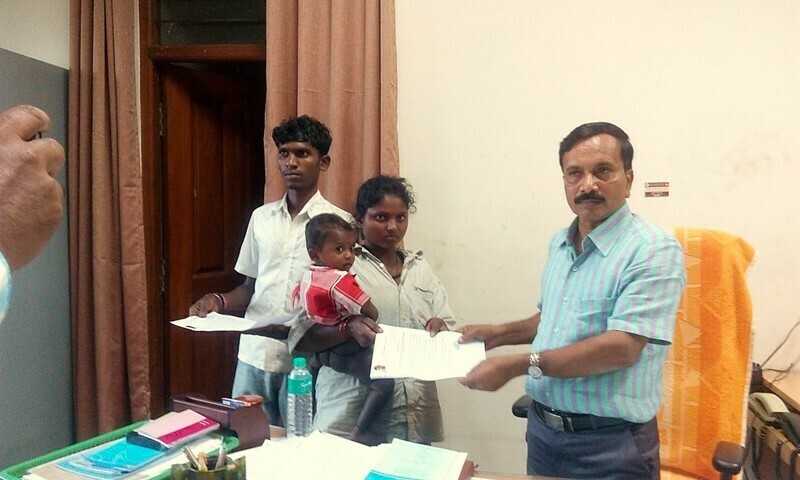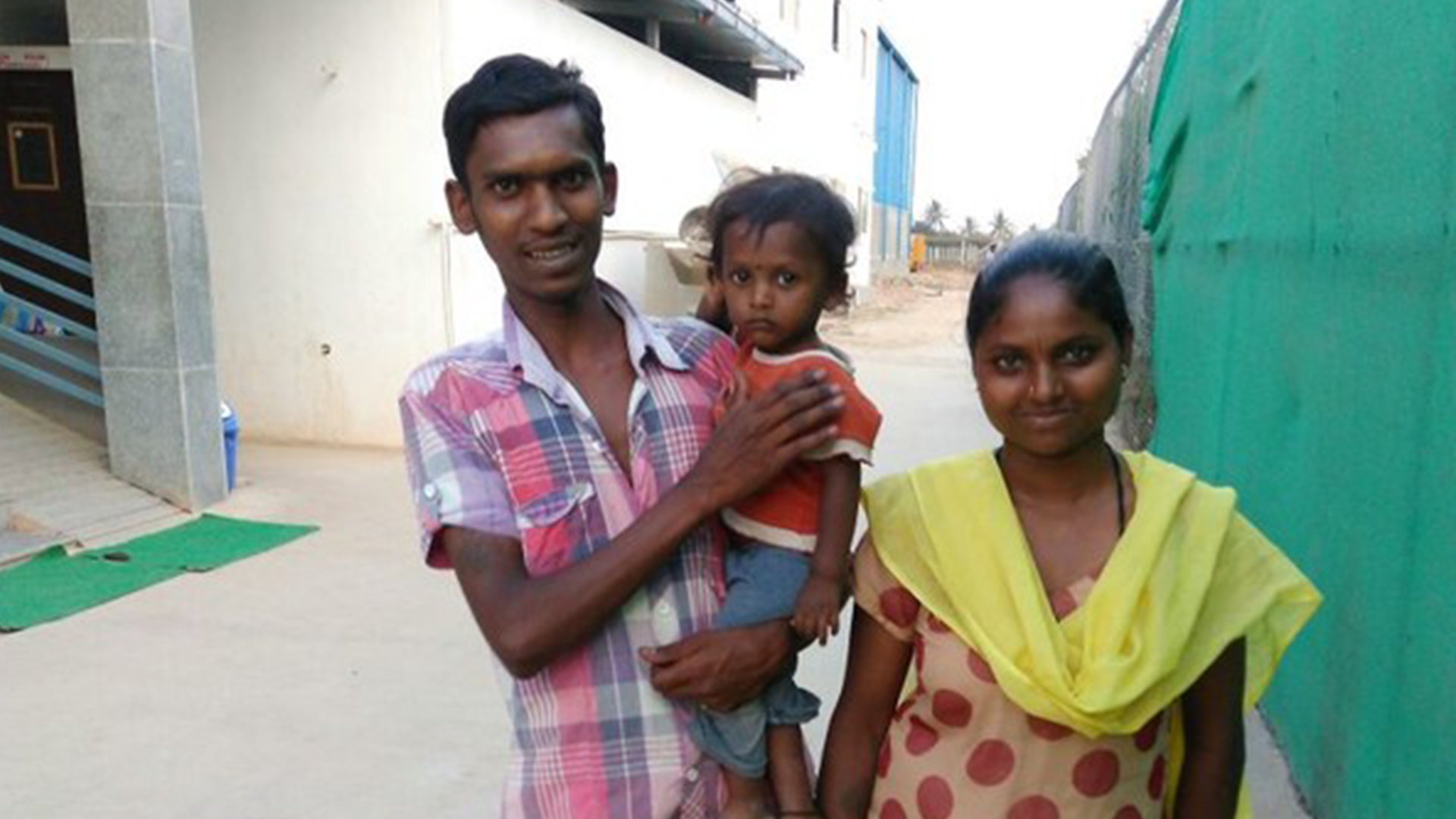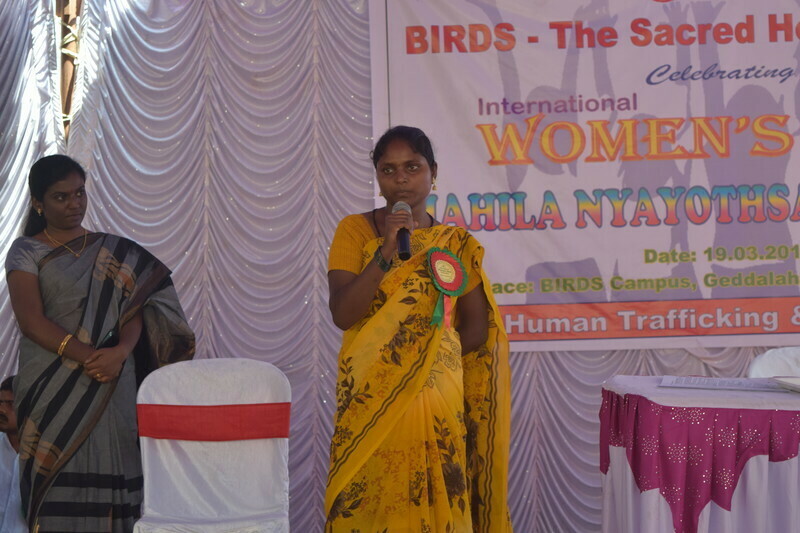Roopa's Story

BANGALORE, INDIA – “I was very happy for the first six years of my life,” Roopa recalls with a smile. Her childhood was full of playing with her loving parents and little brother, studying at school, and enjoying good food and a safe home. She wanted to grow up to become a teacher, and wanted her little brother to become a police officer.
“My parents had land, and they were involved in silk farming,” she remembers. “When my parents were working, I remember playing with Devraj, my brother. We used to help our parents with work and take lunch to them. My parents sent us to Anganwadi (a government-sponsored childcare and mother-care center in India. It caters to the children in the 0–6 age group). The food and other facilities were all very good then.”
At 6 years old, all those good things vanished for Roopa. Her parents sought new jobs at a nearby brick kiln—one with a powerful, intimidating owner—and from there daily life became a nightmare.
It started with their living conditions, as Roopa remembers, “There were no lavatories for us. We were provided with three pots of water for drinking, bathing and cooking every day, which was not enough at all. We did not have space in our house even for the four of us.”
Instead of getting manageable work and good pay, Roopa’s family was forced to mould and haul thousands of heavy clay bricks each day. They toiled from 2:00 in the morning until 9:00 at night alongside other families trapped with them. Even children like Roopa were made to push carts laden with sand, dust the facility, or help bake the bricks. They had no time for school, rest or play.
Roopa and Devraj used to sit up together at night and talk about how wonderful their lives in the village had been—when they had good food and good clothes—compared to this painful new place.
“We did not have a lot to eat,” Roopa remembers. “We were given only 300 rupees for the entire family per week. Our family needed about five kilograms of rice, but could only end up buying two, plus a few tomatoes and chillies…My parents cooked for me and my brother, and they would go to sleep with an empty stomach.”
Constant Insults, Intimate Abuse
Presiding over Roopa’s nightmare was the haughty and powerful kiln owner, who controlled the labourers with threats, violence and false debts.
If a family missed their thousand-brick daily quota, he and his men rained down vicious beatings and verbal abuse. He also taunted his starving workers by eating rich meals in front of them, and he often sexually harassed the young women in the kiln.
“The owner was very bad. He used to look at us in a low manner,” Roopa remembers angrily. “When my father was not at the facility, the owner used to abuse my mother emotionally and physically. He was the same with all the women, which is why the families feared if he would behave the same with the girl children once they came of age.”
Through uncontrollable tears, Roopa recalls once seeing her own mother being sexually assaulted, with no one there to help.
“I saw my mother with him, but I was unaware of all this at that age. I questioned her as to why her hair was all muddy and why she looked messy…She said she feared the owner, as he held a knife and threatened her. She held on to my leg and begged me not to tell my father.”
Gaining and Losing a Family
In hopes of protecting their daughter, Roopa’s parents arranged for her to marry a young man named Banaiah from another, nearby brick kiln. He had also grown up in slavery, and he tried his best to give them a good home.
Thirteen-year-old Roopa moved to the brick factory where Banaiah lived and discovered a radically different experience from her childhood. While there was still a lot of manual labour, the kiln owner treated them well and often shared food, medical care and advice with the young teen couple.
After just six months, however, Roopa’s family contacted her and pleaded for her and Banaiah to return. Her parents’ kiln owner pressured them constantly to bring the newlyweds home, to put them to work and make even more bricks.
“I was very scared, as I knew how the owner was,” Roopa admits. “I told Banaiah that the owner looked at women very lowly, and we would suffer if we went to the brick kiln.”
She continues, “Banaiah was very close to my parents and told me that he would listen to them and go to the brick kiln where they worked no matter what, even if I didn’t accompany him. I told him I will go where he goes, as I cannot live without him.”
“After three months, the owner started torturing both of us,” Roopa describes. “He made Banaiah work from 2:00 am to 9:00 pm. I could not touch the hot brick from the furnace, but he made me do it with bare hands. I also had to dig ashes from the ground. If I breathed those ashes, I would get sick. I had to make clay, blow the ashes and put the bricks in the sun to dry.”
The stress of life in the kiln took its toll on all the families trapped inside. In an argument over Roopa’s father’s alcoholism, it came out that her mother had been forced to provide sexual favours to the kiln owner. He admitted he already knew, but the shame and scandal became too much for the family to bear. Roopa remembers solemnly, “That same night, my parents left the facility. I have not seen them since then. I do not have a family since that night.”
A Devastating Loss
At 16 years old, Roopa became pregnant with her first child. She was still forced to work throughout her pregnancy, even though her tasks were relentlessly hard on her tiny frame.
In her aching eighth month, Roopa was pulling on the rough rope of a pulley system, drawing bags of sand up to her husband in a storehouse, when the rope snapped, the bags tumbled down, and Roopa was knocked solidly to the floor.
The pain was unreal. She was bleeding and couldn’t walk. The kiln owner refused to let her see a doctor, so for a day and a half, she writhed on the dusty floor of her small hut, surrounded by distraught older women, and screamed out in agony: “The baby inside me is dying!”
At 5:00 in the morning on the second day, 16-year-old Roopa delivered her stillborn baby and collapsed. She almost died. But within a week, she was forced back to work. She was still bleeding, and her breasts were swollen with milk she’d never use—but there was nothing she could do.
“I had just undergone the stillbirth, and it was very painful,” she says quietly. “The owner never allowed me to take rest through all this pain. He verbally abused me every day.”
Escape for Her Son’s Future
When Roopa became pregnant again a few years later, Banaiah decided to make thousands of bricks by himself every day so she could rest. He told her, “No matter what happens to me, you will not work. We have already lost one child. I don’t want us to lose the other.”
Bringing their son, Vijay (which means “victory”), into the world helped reinvigorate the young couple—and motivated them to plan their escape from the brick kiln and a life of slavery.
One night as Roopa cooked their small meal, she asked her husband plainly, “What do we do? If we stay in this situation, your son will be in the same situation as you for the rest of his life. Nobody will be able to help him.”
Bravely, the couple made their escape late one night and ran, desperately, to hide in the forests nearby. They survived off paltry earnings from selling firewood for six months and got by with whatever they could. Each morning, they lived in fear they would be discovered by the kiln owner and his henchmen and forced back into slavery once again.
It happened when they snuck back into the village to bring baby Vijay to a doctor. Just as Banaiah left to get them a meal, the kiln owner spotted Roopa and the baby and confronted her.
“He dragged me to the middle of the road and started abusing me verbally in front of everyone,” she says shyly. “I was looking everywhere for Banaiah, but could not find him. The owner’s brother quickly called an auto-rickshaw and took me to the owner’s house.”
Immediately, Roopa was forced back to work in the owner’s home and openly taunted by his henchmen. The kiln owner’s wife took pity and offered her some food, but her husband made her stop, saying, “We shouldn’t give rice to people like these. We should give them only human excrement.”
Rescue and the Road to Restoration
As Roopa and Vijay starved and struggled inside the kiln, Banaiah was left frantic and terrified outside as he searched for anyone who could help. At last, he was connected to a local NGO that had been trained by IJM just one week before on bonded labour slavery cases like these.3 This team quickly called IJM and the anti-trafficking police, and together we planned a rescue operation to free Roopa and arrest the abusive kiln owner.
Roopa remembers, “After three days [in the kiln], I saw five cars with police who came to enquire with the owner. The owner claimed I went back by myself, but I said, ‘No, sir. He forced me to come here.’ I told the police all that had happened, from the beginning. The police told me not to worry—they would get me out of there.”

Banaiah and Roopa on the day of rescue in November 2015.

The family shortly after rescue.
That day, in November 2015, Banaiah, Roopa and Vijay tasted true freedom for the first time in their lives.
After they patiently recounted their harrowing story to the police, IJM helped the family get the food, medical care and shelter they desperately needed. Since the rescue, they have joined our two-year aftercare program to help them recover from the abuse and rebuild a life in freedom—a life worthy of their tiny son. Along the way, they’ve participated in monthly meetings with other former slaves and regular check-ins with their IJM social worker.
IJM and local police are continuing to follow up on holding the slave owner accountable for abusing Roopa’s family for so long. For now, their ties to him are fully broken and they can live daily life without fear.
Today, quiet Banaiah has found a good job in a small manufacturing plant near their temporary home. Twenty-year-old Roopa takes care of Vijay during the day, and hopes to learn tailoring or handicrafts to support her family in the future. Her little boy, now 2, is active and headstrong but clings to his beloved parents wherever he goes.
Just a few months after her rescue, Roopa agreed to share her story at several awareness-raising events for government officials and community members. Once shy and soft-spoken, she’s becoming a powerful voice for the poor and vulnerable in her community.
“Now, Banaiah and I are very happy,” she says with a girlish smile. “We have good access to food, shelter and clothing. We are very happy now.”

Roopa sharing her story in March 2016 with community members to raise awareness of human trafficking